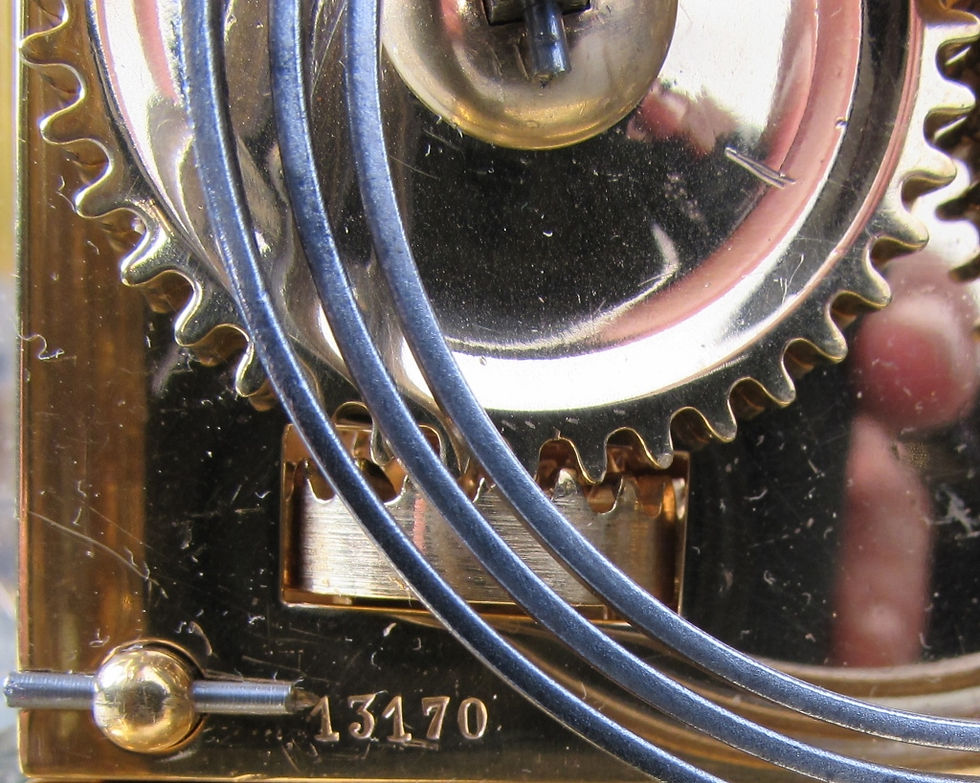Leigh Extence
Fine Antique Clocks
Arsène Margaine: A Carriage Clock with Rare David Keys Winding

A Corniche carriage clock with a rare form of underside winding, not seen previously, and reminiscent of that used by Leroy on several their clocks, but with some differences. Although unsigned as such, this example was made in the Arsené Margaine workshops as can be seen from the style of winding arrow, the type of regulation index engraving and the font used for the wording Aiguilles.
Another almost identical Corniche example, numbered 12931, is in a collection of a friend in Australia, but with the addition of the Margaine trademark to the backplate, as well as being signed on the dial for David Keys, 91 Piccadilly, London along with Paris Made. His example has the same dial and hands, as well as all the same style of backplate markings confirming that these were indeed from the Margaine workshops. The eight-day duration movement strikes the hours and half-hours on a gong with a push button repeat of the last hour at will. The backplate is stamped with the serial number 13170. The winding arbors have attached large toothed wheels which connect through the base to two butterfly wheels, which when turned wind both the going and striking trains alleviating the need to open the rear door or use a key. The circular winders to the underside are stamped with the number 70, along with Patent No. 2886, DKEYS, and fold open to create a semi-circular handle to allow for winding. The white enamel dial has black Roman numerals and blued steel moon hands. The Corniche case is of a style typical of Margaine, with relatively bold three-bale handle and slightly softer corners. Knowing that the other known example is signed on the dial for David Keys would confirm that the DKeys as stamped on the winding handles on this piece, along with the patent number 2886, is indeed his patent and he had these clocks made for him by Margaine.
Height: 7 inches (handle up): 5¼ inches (handle down)
Francois Arsené Margaine was a fine carriage clock maker who worked in Paris at rue Bondy, 54 having had various addresses in the city. He bought his blancs roulants from both Saint Nicolas d'Aliermont and the Franche Comte.
For a comprehensive history of Margaine, his clocks and working practices see Antiquarian Horology, the journal of the Antiquarian Horological Society, June 2014, pages 807 to 826 inclusive; The Horological World of Francois Arsené Margaine by Tom Wotruba.
David Keys, born 1813, is known to have been working at 14 Craven Street, London in 1858 and then number 15 from circa 1873 until at least 1887, the year of his death, with retail premises at 91, Piccadilly, the business having been taken over by his son William. They are recorded as making deck watches for the Admiralty between 1892 and 1897 and used Eiffe’s auxiliary and Airy’s compensation balances.
As a maker of fine watches, David Keys took out a patent, alongside John Chalfont of Islington, in December 1861, No. 3160, for keyless winding of fusee watches, and another in September 1865, numbered 2330 and it may well be an adaption of this system as used on this clock. William died in 1899 at the age of forty.
A watch signed for David Keys was sold at Hampton & Littlewood Auctioneers, Exeter, in 2003
Price: On Application
Ref: D447
To download an article I wrote for the National Association of Watch & Clock Collectors related to this clock and the bottom-wind clocks of David Keys whilst working with Margaine click on the following link:
Click on slide show below to view full images



